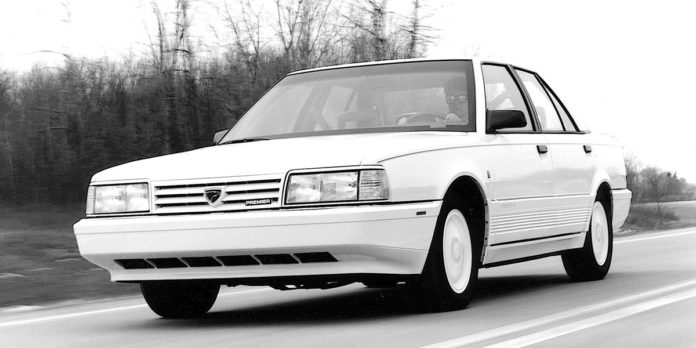From the June 1989 issue of Car and Driver.
The lap of luxury is especially cushy in Eagle’s latest Premier ES, the Limited. No bad thing, because the ES—new last year—remains one of the best-behaved sedans on the road. Alas, due to the acclaim heaped upon Ford’s Taurus/Sable and the rapture piled high onto the roadpuckering Taurus SHO, the Premier ES remains an underground delight buried in the sales charts. The Limited wears standard ES bodywork covered exclusively in startling ultrawhite, putting on a far-flashier show. This Eagle also takes heart from mechanical and interior refinements that enhance its natural-born coordination, livability, and likability.
Likability figures high in the ES’s rising stock here at C/D. We find everybody voicing, almost word for word, the same first thought: “I like it.”
We like its steering, tracking, handling, ride, comfort, and all-around performance. We like Ford’s Taurus and Sable, too, but their quirks are beginning to nip away at their likability. Their steering feels numb and artificial. They don’t brake with silky linearity. Their engines need smoothing—especially at high rpm. Ford had its better idea—modern aerosedans—first among domestic makers, but amid record profits it’s been slow to update its brainchildren.
The boxy Premier looks less futuristic than the oval Fords (though it sports a comparable drag figure). It also checks in as something of a half-breed orphan. Created by Renault and American Motors, developed in Europe and America, and built in Canada, the Eagle was adopted by Chrysler when it bought out the Franco-American partnership. In a lucky twist, the Premier turned out to be by far the best sedan among Chrysler’s otherwise ordinary four-doors. Chrysler realized its luck, and now it’s made the ES more noteworthy.
Certainly the exterior has become more noticeable. In one fell swoop of paint and plastics, the ES comes up whiter than midday sun in the Sahara. Following the monochromatic trend set by AMG, Germany’s speed king among Mercedes tuners, Eagle even finishes the ES’s alloy wheels in white. Their starkness highlights an increase in diameter from fourteen to fifteen inches. The wheel width remains 6.0 inches, but this ES Limited’s wheel wells pack 205/60HR-15 Goodyear Eagle GT+4s. Compared with the regular ES’s 205/70HR-14 Eagle GT+4s, the slim 60-series 205s—still good for low drag and good tracking—squat down for added responsiveness. These lower-profile Eagles fly right: cornering power soars from 0.75 to 0.81 g, yet without the flap of high drama. Nothing to it. Amazingly, the compliant ride provided by the ES’s cunningly beefed front coil-sprung struts, rear torsion-bar-supported trailing arms, and anti-roll bars reveals an absence of added harshness but improved bump absorption.
Potential customers who walked out of Eagle showrooms without buying a Premier often cited the lack of leather upholstery. We prefer cloth for hard driving (no slippery sliding, and it’s considerably comfier when hot or cold), but leather now comes standard in the Limited—and it looks absolutely great.
Not so the Eagle’s plastic dash and console. They glare inexpensively amid the mostly classy fitting—classy, but smooched with the French kiss of Gallic design. The instrument layout is fine, the seats facing it are roomy and receptive, and patience will one day allow your fingers to tamper effectively with the control pods perched behind the wheel. But you’ll never forget that you’re in an angle-edged, Franco-filed interior.
The ES’s Renault-built 3.0-liter V-6, humming through a four-speed automatic transmission wisely revised for smoother shifting, makes 150 hp. That’s obviously not enough to imitate the Yamaha-built, 220-hp SHO V-6. The Eagle runs from 0 to 60 mph in 9.5 seconds, nearly three seconds slower than the Taurus SHO. Due to lesser Eagles’ lesser tires, a top-speed cutoff steps in abruptly at 109 mph. (Remembering the old ES’s 126-mph top end, our Doctor Dragway, Mr. Bissoon-Dath, says the new model’s initials must stand for “Extra Speed” Limited.) Braking feel remains good. Thanks to better balance, stops from 70 mph shrink from 218 to 195 feet. We’d be happier, of course, if the stops were shorter still.
The Taurus SHO, potent and hard-edged, and the ES Limited, polished and refined, wear prices within a grand or two of each other. Each offers clear virtues, confusing our instincts. But if the choice were between their less expensive siblings, the Premier ES and the Taurus LX, we might be inclined to chance the wings of a promising Eagle rather than the horns of a half-bullish Ford.
Specifications
Specifications
1989 Eagle Premier ES Limited
Vehicle Type: front-engine, front-wheel-drive, 5-passenger, 4-door sedan
PRICE
Base/As Tested: $19,181/$19,631
ENGINE
SOHC V-6, aluminum block and heads, port fuel injection
Displacement: 182 in3, 2975 cm3
Power: 150 hp @ 5000 rpm
TRANSMISSION
4-speed automatic
DIMENSIONS
Wheelbase: 106.0 in
Length: 192.8 in
Curb Weight: 3156 lb
C/D TEST RESULTS
60 mph: 9.5 sec
1/4-Mile: 17.2 sec @ 82 mph
100 mph: 28.1 sec
Top Speed: 109 mph
Braking, 70–0 mph: 195 ft
Roadholding, 300-ft Skidpad: 0.81 g
C/D FUEL ECONOMY
Observed: 18 mpg
EPA FUEL ECONOMY
City: 18 mpg
C/D TESTING EXPLAINED


